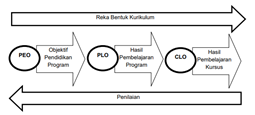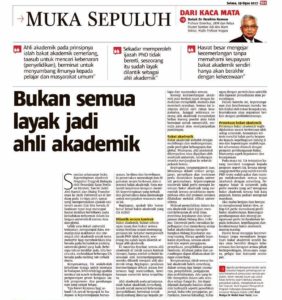Lecturer-CenteredStudents are viewed as “empty vessels” whose primary role is to passively receive information |
Student-CenteredThe teacher’s primary role is to coach and facilitate student learning and overall comprehension of material |
|
|
TEACHING AND LEARNINGAPPROACHES, STRATEGIES, METHODS, ACTIVITIES
Engaging Learners Through Active Learning
The following are 20 informal class learning structured activities that can be used in the classrooms.
Click here => active learning
PENYEDIAAN COURSE ASSESSMENT REPORT (CAR) DAN ANNUAL PROGRAM ASSESSMENT REPORT (APAR)
Major German Universities Cancel Elsevier Contracts
These institutions join around 60 others that hope to put increasing pressure on the publishing giant in ongoing negotiations for a new nationwide licensing agreement.
 BRYAN SATALINOIn Germany, the fight for open access and favorable pricing for journals is getting heated. At the end of last month (June 30), four major academic institutions in Berlin announced that they would not renew their subscriptions with the Dutch publishing giant Elsevier once they end this December. Then on July 7, nine universities in Baden-Württemberg, another large German state, also declared their intention to cancel their contracts with the publisher at the end of 2017.
BRYAN SATALINOIn Germany, the fight for open access and favorable pricing for journals is getting heated. At the end of last month (June 30), four major academic institutions in Berlin announced that they would not renew their subscriptions with the Dutch publishing giant Elsevier once they end this December. Then on July 7, nine universities in Baden-Württemberg, another large German state, also declared their intention to cancel their contracts with the publisher at the end of 2017.
These institutions join around 60 others across the country that allowed their contracts to expire last year.
The decision to cancel subscriptions was made in order to put pressure on Elsevier during ongoing negotiations. “Nobody wants Elsevier to starve—they should be paid fairly for their good service,” says Ursula Flitner, the head of the medical library at Charité–Berlin University of Medicine. “The problem is, we no longer see what their good service is.”
Charité–Berlin University of Medicine is joined by Humboldt University of Berlin, Free University of Berlin, and Technical University of Berlin in letting its Elsevier subscriptions lapse.
“The general issue is that large parts of the research done is publicly funded, the type setting and quality control [peer review] is done by people who are paid by the public, [and] the purchase of the journals is also paid by the public,” says Christian Thomsen, the president of the Technical University of Berlin. “So it’s a bit too much payment.”
Project DEAL, an alliance of German institutions led by the Hochschulrektorenkonferenz (German Rectors’ Conference), has been working to establish a new nationwide licensing agreement with three major scientific publishers, Elsevier, Springer Nature, and Wiley, since 2016. “The ‘big three’ cover up to 50 to 60 percent of many library budgets in Germany,” says Andreas Degkwitz, the director of the library at Humboldt University, which is among those represented by DEAL. “Elsevier is the biggest of these.”
Sources would not disclose the costs of subscriptions because their contracts are confidential. But according to Degkwitz, in general, the price of journal subscriptions across all publishers has been increasing on an average of about 5 percent per year.
The universities that cancelled their contracts are supporting DEAL’s three key demands: fair pricing based on the number of publications, open access to all publications by scientists at German institutions, and permanent access to Elsevier’s electronic journals for scientific bodies represented by the DEAL project. If these objectives are met, payments would no longer be made for journal subscriptions—instead, scientific institutions and funders would pay a certain sum per published article, which would immediately become openly available, Flitner explains.
“I don’t see an immediate end [to the negotiations with Elsevier],” Degkwitz adds. “With Springer and Wiley we might have a contract in the beginning or in the first months of 2018, and so far the cancellations of those subscriptions have not been discussed.” He also points out that Springer has already agreed to implement the “publish and read model,” which combines reading and publishing into one combined fee, with some European institutions.
When asked for comment, Elsevier pointed to a statement it released in June and would not provide further details. “Researchers should also know that Elsevier is working diligently to find a mutually acceptable solution with the Hochschulrektorenkonferenz (HRK) and to put a new agreement in place this year, ensuring uninterrupted access,” the company writes in the release. “Elsevier agrees with all of HRK’s basic requests for a national license and open access, and this is reflected in the numerous constructive proposals that we have submitted to HRK.” However, what this means with respect to DEAL’s three objectives remains unclear.
The DEAL project also declined The Scientist’s request for comment.
Global pressure
With increasing publication fees and a growing shift towards open access, academic institutions across Europe are pushing for better contracts with publishing companies.
For example, the Association of Universities in the Netherlands (VSNU) engaged in similar discussions with Elsevier in 2015, and came to an agreement to make 30 percent of Dutch papers in VSNU-subscribed journals open access by 2018.
However, “the Elsevier contract in the Netherlands is not very good, because you have limitations for open access, it’s designated to certain journals, and so on,” Degkwitz says. “The German DEAL group said we don’t want a similar contract, we want to try to challenge Elsevier to an entirely new pricing or business model.”
The Finnish library consortium (FinElib), which represents universities, research institutes, and public libraries in Finland, is also currently negotiating with Elsevier and other major publishers to increase open access and to make pricing more affordable. “I would say that it looks like we are in the same situation with Germany in that Elsevier is not willing to move towards open access,” says Arja Tuuliniemi, who is head of the FinELib consortium and part of its Elsevier negotiation team “Of course, Elsevier says they already have open access models, but the problem is that they charge big [fees] for open access, and that’s not acceptable.”
Currently, the price of publishing a single open access article with Elsevier ranges from $500 to $5,000 USD. The fee for a Cell, Neuron, or Current Biology article, for example, is $5,000 USD, while publishing a paper in Cortex or Genomics Data costs $2,800 USD and $500 USD, respectively.
FinELib’s subscriptions to Elsevier continue until the end of 2017, and if an agreement is not reached by that time, the consortium will not renew its contracts. More than 400 members of the Finnish research community have already started a boycott of the publishing giant in the “No deal, no review” movement.
Similar negotiations have also occurred outside of Europe. Last December, the Consortium on Core Electronic Resources in Taiwan (CONCERT), which represents more than 140 Taiwanese institutions, cancelled Elsevier’s services due to high fees. Meng-ling Lin, the project lead of CONCERT, tells The Scientist in an email that the two parties have since come to an agreement, and that most institutions have now renewed their contracts. However, 17 percent remain unsubscribed due to “budget constraints,” Lin adds.
In Germany, it’s unclear how long the boycott will last. “We all hope that Elsevier and other publishers will side with research again,” Flitner says. “But if they don’t, I think the publishing culture will change faster than before, and universities and researchers will find their own ways to publish over the Internet and to build up the information infrastructure best suited to meet their needs.”
Is this Japanese concept the secret to a long, happy, meaningful life?
What’s your reason for getting up in the morning? Just trying to answer such a big question might make you want to crawl back into bed. If it does, the Japanese concept of ikigai could help.
Originating from a country with one of the world’s oldest populations, the idea is becoming popular outside of Japan as a way to live longer and better.
While there is no direct English translation, ikigai is thought to combine the Japanese words ikiru, meaning “to live”, and kai, meaning “the realization of what one hopes for”. Together these definitions create the concept of “a reason to live” or the idea of having a purpose in life.

Ikigai also has historic links: gai originates from the word kai, which means shell. These were considered very valuable during the Heian period (794 to 1185), according to Akihiro Hasegawa, a clinical psychologist and associate professor at Toyo Eiwa University, adding a sense of “value in living”.
To find this reason or purpose, experts recommend starting with four questions:
- What do you love?
- What are you good at?
- What does the world need from you?
- What can you get paid for?
Finding the answers and a balance between these four areas could be a route to ikigai for Westerners looking for a quick interpretation of this philosophy. But in Japan, ikigai is a slower process and often has nothing to do with work or income.
In a 2010 survey of 2,000 Japanese men and women, just 31% of participants cited work as their ikigai.
Gordon Matthews, professor of anthropology at the Chinese University of Hong Kong and author of What Makes Life Worth Living?: How Japanese and Americans Make Sense of Their Worlds, told the Telegraph that how people understand ikigai can, in fact, often be mapped to two other Japanese ideas – ittaikan and jiko jitsugen. Itaikkan refers to “a sense of oneness with, or commitment to, a group or role”, while jiko jitsugen relates more to self-realization.
Matthews says that ikigai will likely lead to a better life “because you will have something to live for”, but warns against viewing ikigai as a lifestyle choice: “Ikigai is not something grand or extraordinary. It’s something pretty matter-of-fact.”
Have you read?
Okinawa, a remote island to the south west of Japan, has an unusually large population of centenarians and is often referred to in examinations of ikigai – though not by Gordon.
According to Dan Buettner, an expert on Blue Zones, the areas of the world where people live longest, the concept of ikigai pervades the life of these islanders. Combined with a particular diet and support network of friends or “moai”, ikigai is helping people live longer on Okinawa as it gives them purpose, he says, who provides a karate master, fisherman and great-great-great-grandmother, all of whom are more than 100 years old, as examples.
But knowing what your ikigai is not enough – all of these people put their purpose into action, says Buettner. Researchers stress that ikigai can change with age. For anyone whose work is their reason for living, this will come as a relief as they approach retirement and begin the search for a new ikigai.
For more reading, click here




Recent Comments